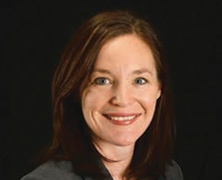ADVANCING SCIENCE AND MEDICINE
ACCOMPLISHED SCIENTIST IMPROVING MEDICAL OUTCOMES
Dr. Heather Prichard works to develop technologies for improving medical treatment for a variety of diseases. As a scientist with the privately held research and regenerative medicine company Humacyte, Prichard leads the research, pre-clinical, and product development for HUMACYL™, the company’s innovative bioengineered blood vessel.
Prichard is an accomplished scientific leader with a track record of guiding product development from concept to commercialization. Under her leadership, Humacyte has successfully developed technology leading to clinical trials on HUMACYL, working toward efforts to make bioengineered human organs a reality. The seminal Phase II trial results to test HUMACYL as a bypass graft in patients with peripheral arterial disease were published in 2015 and Phase III trials are currently enrolling in clinical sites in the U.S., Europe, and Israel.
Prichard’s work is helping to expand the availability of Humacyte’s biomedical products with the potential to be life-changing technologies today for patients who undergo hemodialysis, and in the future for thousands who face bypass surgery. Her scientific contributions are making an impact in the world of science and medicine, that goes far beyond current applications.
In the words of Dr. Heather Prichard:
How can the world increase diversity in STEM fields?
“Driving diversity across STEM industries is a message that needs to be voiced and accepted. Businesses must acknowledge that organizations that have gender balance at the senior management level perform better financially. The world needs to build momentum and create chatter and awareness for diversity in the space, and there are small steps that organizations can take to ensure the movement progresses. Businesses must ensure that women have a seat at the senior leadership table and have a chance to seize more opportunities, encourage male allies to support their fellow women scientists and technologists, and educate their organizations on unconscious bias in the workplace through revisions in their hiring practices and the creation of policies that support a diverse pool of male and female workers.”
What can be done to move women forward in STEM?
“Stronger and more robust conversations around the importance of STEM need to happen throughout all industries. Professors and educators must remain a figure of support to professional and collegiate women in technical careers to increase the number of women in STEM.”
Words I live by:
“There are many ideas I try to embrace in both my personal life and career. Some of the most prominent are to embrace one’s own strengths and find a small way every day to make yourself and someone around you better.”







